|
|
|
Sort Order |
|
|
|
Items / Page
|
|
|
|
|
|
|
| Srl | Item |
| 1 |
ID:
149479
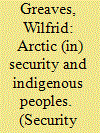

|
|
|
|
|
| Summary/Abstract |
While international relations has increasingly begun to recognize the political salience of Indigenous peoples, the related field of security studies has not significantly incorporated Indigenous peoples either theoretically or empirically. This article helps to address this gap by comparing two Arctic Indigenous peoples – Inuit in Canada and Sámi in Norway – as ‘securitizing actors’ within their respective states. It examines how organizations representing Inuit and Sámi each articulate the meaning of security in the circumpolar Arctic region. It finds that Inuit representatives have framed environmental and social challenges as security issues, identifying a conception of Arctic security that emphasizes environmental protection, preservation of cultural identity, and maintenance of Indigenous political autonomy. While there are some similarities between the two, Sámi generally do not employ securitizing language to discuss environmental and social issues, rarely characterizing them as existential issues threatening their survival or wellbeing.
|
|
|
|
|
|
|
|
|
|
|
|
|
|
|
|
| 2 |
ID:
150656


|
|
|
|
|
| Summary/Abstract |
A decision-making model was constructed to assist remote Australian Indigenous communities select appropriate climate change mitigation programs. The Resilient Community and Livelihood Asset Integration Model (ReCLAIM) comprises six steps that focus on community assets and aspirations. The second of these steps is to determine the baseline carbon profiles of communities based on six sources of carbon emissions: materials, construction processes, stationary energy, transport, water systems and waste. The methodology employed an annualised lifecycle analysis of housing materials and construction, and an annual inventory of other emission sources. Profiles were calculated for two remote communities and compared to the Australian average and also average electricity consumption by remote communities in the Northern Territory.
|
|
|
|
|
|
|
|
|
|
|
|
|
|
|
|
| 3 |
ID:
127099
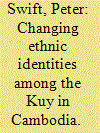

|
|
|
|
|
| Publication |
2013.
|
| Summary/Abstract |
The Kuy are one of the largest Indigenous groups in Cambodia. Though they are extremely similar to the Khmer in terms of physical appearance and material culture, a significant distinction between the two groups continues to be maintained. At the same time, assimilation into the Khmer identity has been a dominant trend among the Kuy for a considerable time and appears to be related to the relatively lower status of the Kuy identity. However, over the past decade or more, some people have begun to reassert a Kuy identity, driven by awareness of benefits of identifying as Kuy and a lessening of the stigmatisation of the Kuy identity. Following the introduction in Cambodia of the concept of Indigenous Peoples, 'Indigenous' has become an ethnic identity that more and more Kuy are assuming and within which they are becoming prominent. It is associated with a broader Indigenous community inside and outside of Cambodia which is becoming increasingly respected. The Indigenous identity has been able to inspire pride and confidence in a way that the Kuy identity has not and has played an important role in letting people of Kuy ancestry 'become Kuy'.
|
|
|
|
|
|
|
|
|
|
|
|
|
|
|
|
| 4 |
ID:
187283
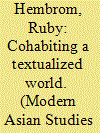

|
|
|
|
|
| Summary/Abstract |
Stories matter—writing them down matters. For indigenous (Adivasi) peoples from oral traditions, literature has become a way to maintain culture and keep it alive. This article too is a story—an investigative one—questioning and vocalizing the challenges we encounter in trying to articulate our realities and histories in a form that is new to us, one that we've been denied as a practice and one we are not believed we are entitled to use. Mainstream cultures have side-lined, overshadowed, and subjugated our knowledge systems, placing us in structures we have to traverse, and within which we have to exist, which is possible only by internalizing and mirroring others' or mainstream ways and languages to gain legitimacy as peoples or, worse, being branded and judged by their versions of narratives of us. This article plots the course of Adivasi histories and narratives enduring, outlasting, or being demolished by dislocation and dispossession, by dominant languages and cultures, and how both writing and orality are practices of both resistance and resurgence.
|
|
|
|
|
|
|
|
|
|
|
|
|
|
|
|
| 5 |
ID:
095594


|
|
|
|
|
| Publication |
2010.
|
| Summary/Abstract |
This article provides a comparative investigation of education programmes intended to revitalise te reo (the language of the M?ori, indigenous to Aotearoa New Zealand) and Mapudungun (the language of the Mapuche, indigenous to Chile), respectively. The historical processes of colonisation and globalisation in Chile and Aotearoa New Zealand that have threatened indigenous language are outlined, and revitalisation efforts subsequently described and assessed. Finally, the disparities in success that the two countries have experienced in their revitalisation efforts are examined, and some recommendations made.
|
|
|
|
|
|
|
|
|
|
|
|
|
|
|
|
| 6 |
ID:
155549
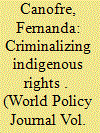

|
|
|
|
|
| Summary/Abstract |
Brazil is in the midst of perhaps the most sweeping criminalization of indigenous rights in recent history. The “ruralists,” politicians in Congress with ties to the country’s influential agribusiness lobby, are pushing through legislation to rob independent government agencies of the ability to designate ancestral land for indigenous peoples. Brazilian journalist Fernanda Canofre reports on the politics behind the nation’s land battles, which killed more than 60 people last year.
|
|
|
|
|
|
|
|
|
|
|
|
|
|
|
|
| 7 |
ID:
161647
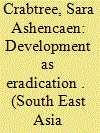

|
|
|
|
|
| Summary/Abstract |
The political rhetoric of social and economic development in Malaysia is used as a dominant and largely unquestioned discourse to justify the industrialized exploitation of the traditional territories of the indigenous people of West Malaysia. This article explores social policy drivers in respect of findings from a condensed ethnography of the Jakun Orang Asli people of Tasik Chini in the State of Pahang. Tasik Chini provides an important example of a wider problem affecting many Orang Asli communities in Malaysia relating to industrial exploitation, but is a case of special interest in respect of its significance as a site of rich and unique biodiversity, as well as being home to one of only two freshwater lakes in West Malaysia. Notably, Tasik Chini is also a UNESCO Biosphere Reserve, of which there are only two in Malaysia. The lake and surrounding forests have provided the Jakun villagers with abundant natural resources for subsistence, but now the area is badly eroded and polluted by the ravages of big business. This presents a serious dilemma for the Jakun concerning whether to resist the destruction of their traditional way of life or to comply with state agendas and collude with their loss of self-sufficiency and autonomy. As such, the situation in Tasik Chini raises important questions regarding national social policy drivers and the position and welfare of indigenous people in Malaysia.
|
|
|
|
|
|
|
|
|
|
|
|
|
|
|
|
| 8 |
ID:
126662
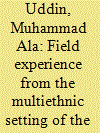

|
|
|
|
|
| Publication |
2013.
|
| Summary/Abstract |
Conducting research in the home country brings diverse experiences to a researcher as the researcher is considered as both insider and outsider by the informants. I conducted fieldwork in the Chittagong Hill Tracts - a multiethnic setting situated in the southeastern part of Bangladesh - where I was considered both insider and outsider. In the light of such experiences, in this article I discuss the researcher's position and the level of engagement - how a researcher situates himself or herself in the field and gathers information from different people. This article also discusses briefly the methodological procedures of the study.
|
|
|
|
|
|
|
|
|
|
|
|
|
|
|
|
| 9 |
ID:
081260
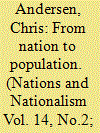

|
|
|
|
|
| Publication |
2008.
|
| Summary/Abstract |
Between 1996 and 2001 the 'Métis population' of Canada skyrocketed from 204,000 to 292,000, an astonishing and demographically improbable increase of 43 per cent. Most puzzling about this 'increase' is not so much the unpersuasive explanations offered by statisticians and others but, more fundamentally, the underlying assumption that such a thing as a 'Métis population' exists at all. In contrast, I argue that such an idea constitutes an artifact of Canada's racial/colonial episteme in which 'the Métis' - formerly an indigenous nation invaded and displaced in the Canadian nation-state's westward expansion - have been reduced in public and administrative discourse to include any indigenous individual who identifies as Métis: reduced, in other words, to (part of) a race. The paper argues further that the authority of the Canadian census as a privileged forum of contemporary meaning-making in Canadian society is such that the lack of explicit Census categories to distinguish Métis Nation allegiance further naturalises a racialised construction of Métis at the expense of an indigenously national one
|
|
|
|
|
|
|
|
|
|
|
|
|
|
|
|
| 10 |
ID:
086290
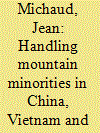

|
|
|
|
|
| Publication |
2009.
|
| Summary/Abstract |
This paper is an overview of issues pertaining to highland minorities in the three socialist countries sharing portions of the Southeast Asian Massif, namely China, Vietnam and Laos. It presents the historical complexity of highland minority policy in these countries. The paper thus depicts prevalent state strategies that aimed, and largely still aim, to handle highland minorities in the most effective and economical way, to ensure that the nation will progress steadily forward. The six current issues of borders and transnationality, taxonomy, indigenous peoples' status, customary land tenure, tourism and environmental issues are then explored critically.
|
|
|
|
|
|
|
|
|
|
|
|
|
|
|
|
| 11 |
ID:
171717
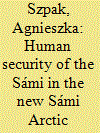

|
|
|
|
|
| Summary/Abstract |
Recent plans and enterprises of the Arctic States of Sweden, Norway and Finland – such as the Finnish plan to build a controversial rail line from Rovaniemi to Kirkenes in Norway, relocation of Swedish Kiruna (already in progress), building Markbydgen windfarm in Sweden or construction of a copper mine in Kvalsund, Norway - have put into question the human security of the Sámi. In this paper, the author examines the contents of the new document The Sámi Arctic Strategy. Securing enduring influence for the Sámi people in the Arctic through partnerships, education and advocacy adopted in 2019. Special emphasis is put on the reflections and references to human security of the Sámi. Then the author briefly examines the above examples and how they may or already affect human security of the Sámi. The research questions are: which parts of the new Sámi Arctic Strategy refer to human security? What is the importance of self-determination to human security of the Sámi? Could this Strategy facilitate implementation of the right of the Sámi to self-determination, and as a result improve their human security? The paper attempts to answer these questions in Concluding Remarks.
|
|
|
|
|
|
|
|
|
|
|
|
|
|
|
|
| 12 |
ID:
112765
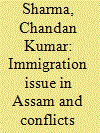

|
|
|
|
|
| Publication |
2012.
|
| Summary/Abstract |
Assam, the northeastern state of India, has experienced strong anti-outsider sentiment for more than half a century now. What makes the Assam case unique is that it has faced both internal as well as illegal international migration in massive scales giving rise to intense existential fear and apprehension among its smaller indigenous communities. Their lack of the required political authority and the indifferent attitude of the Indian Union government in addressing the issue have only multiplied its magnitude. The article explicates the politico-economic dynamics of the immigration issue in Assam and the social tension and conflicts around it in a historical perspective and suggests that a multi-pronged approach backed by strong political will is imperative to negotiate the challenges of immigration in the state in an effective manner.
|
|
|
|
|
|
|
|
|
|
|
|
|
|
|
|
| 13 |
ID:
185109
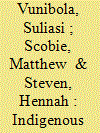

|
|
|
|
|
| Summary/Abstract |
This study examines Indigenous Fijian and Papua New Guinean enterprises on customary land. It explores the duality of merging Indigenous and Western principles of entrepreneurship and the ability to balance business and socio-cultural imperatives. A qualitative, ethnographic-case study approach is deployed, with talanoa/tok stori used to collect empirical materials. Two interrelated themes emerged from the study: The need for Indigenous enterprise models to contribute to a more holistic conception of well-being, and as a result, the requirement to rethink how surplus is distributed beyond mainstream shareholder ownership models. This study reveals a more nuanced approach to distributing surplus based on Indigenous conceptions of kinship. The specific theoretical contribution of this study is an Indigenous conception of surplus distribution that offers a challenge to traditional shareholder models.
|
|
|
|
|
|
|
|
|
|
|
|
|
|
|
|
| 14 |
ID:
189908
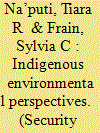

|
|
|
|
|
| Summary/Abstract |
This article centers Indigenous epistemologies to critique the United States oceanic security state, a modality of militarization and blue-washing conservation that extends beyond land borders to encompass federal conceptualizations of national security throughout the Pacific Ocean. Beginning with Indigenous perspectives from Oceania, it provides examples of Indigenous peoples’ continuing connections to ocean spaces and challenges to United States colonial geographic imaginaries and militarized destruction. Then, advancing the concept of the oceanic security state, it examines how United States assertions of sovereignty over Oceania are used to justify hyper-militarization while simultaneously destroying the environment and contributing to the climate crisis. These phenomena occur while the USA remains exempt from federal environmental conservation laws through ‘blue-washing’, and the United States government benefits from the exclusion of military emission data within international climate targets. The findings reveal how militarizing all ocean space in the name of United States national security operates within delineated borders of Exclusive Economic Zones, Marine National Monuments, and Marine Protected Areas. Guided by Indigenous epistemologies, the article concludes with alternative ways of understanding ocean spaces and constructing futures of genuine security.
|
|
|
|
|
|
|
|
|
|
|
|
|
|
|
|
| 15 |
ID:
174552
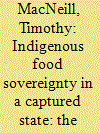

|
|
|
|
|
| Summary/Abstract |
This study explores the emergence of the Afro-Indigenous food sovereignty movement in the context of a captured Honduran state and unequal political economy. In contrast with national-level research that has advocated a policy of food security in the context of non-indigenous campesino movements, this work explains how food sovereignty is more appropriate regarding Garifuna Hondurans. In a political economy that has precluded other options, and given the deep cultural relation that Garifuna activists have to land and autonomy, food sovereignty provides a possibility around which Indigenous development can be animated. It encapsulates a local ‘fight’ response to repression as an alternative to northern ‘flight’, often via migrant caravans, that many Garifuna have undertaken. This study shows how food sovereignty, more than being a technical policy set, is a discursive and material node through which dispossessed and especially indigenous populations can enhance decolonial power in the contestation of entrenched hegemonic and institutionalised power in a corrupt, unequal and colonised political economy.
|
|
|
|
|
|
|
|
|
|
|
|
|
|
|
|
| 16 |
ID:
082037
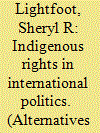

|
|
|
|
|
| Publication |
2008.
|
| Summary/Abstract |
An overcompliant state is one that paradoxically takes actions
that recognize specific rights or a category of rights that go
beyond or even against that state's international human rights
treaty obligations or its normative international commitments.
Since there is no existing IR literature that would explain why
a state might paradoxically comply or "overcomply" with its
stated commitments, there is also no theory to explain what
would propel a state to "overcomply" with an emergent norm.
Securing indigenous rights means that several critical changes
in the international discourse must occur, including an alteration
of the liberal international Westphalian system of state
sovereignty toward a postliberal, plurinational sovereignty system
that includes a separate nation-to-nation and consentbased
shared sovereignty arrangement between states and
indigenous peoples. "Overcompliance" in indigenous rights
occurs under a particular set of conditions: (1) when there is
a strong presence of the international indigenous-rights movement
within the state; (2) when the state places high value on
its reputation as a "good global citizen"; and (3) when change
occurs in the state's domestic discourse as it seeks to locate its
own postcolonial identity in a globalized world. By examining
state "overcompliance," the author seeks to expose the limits of
the current international discourse and the potential to push
that discourse further to better accommodate the full spectrum
of indigenous rights.
|
|
|
|
|
|
|
|
|
|
|
|
|
|
|
|
| 17 |
ID:
189004
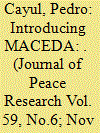

|
|
|
|
|
| Summary/Abstract |
This article introduces MACEDA, a micro-level dataset on the self-determination (SD) conflict between the Chilean state and the indigenous Mapuche. Although SD disputes are one of the most common conflicts in the world, and indigenous movements represent about 40% of all SD movements, this is the first micro-dataset focused on an indigenous SD conflict. MACEDA covers the period 1990–2016, including more than 2,600 events collected from local media. As indigenous conflicts are much less violent in terms of casualties, we take a flexible definition of conflict, based on its constituent events, and we discuss the comparability and generalization of our approach. To illustrate the usefulness of these micro-data in the analysis of conflict-related theories, we present a descriptive empirical analysis on the strategies of indigenous resistance, and we discuss how the data can be used in the causal analysis of conflicts.
|
|
|
|
|
|
|
|
|
|
|
|
|
|
|
|
| 18 |
ID:
173203
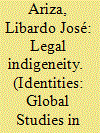

|
|
|
|
|
| Summary/Abstract |
This paper analyses the creation of the indigenous legal subject in Colombia from the perspective of legal-knowledge regimens. It analyses the turn from medical psychiatric assessments to indigenous identity to anthropological discourses on cultural differences. This article describes the legal construction of the indigenous subject in two historical moments. On the one hand, in the context of formation of the nation-state in Colombia and, on the other hand, in the transition towards contemporary multicultural constitutionalism within which legal discourse creates taxonomies for the definition of identities and the recognition of special rights to people who claim to be indigenous.
|
|
|
|
|
|
|
|
|
|
|
|
|
|
|
|
| 19 |
ID:
156647
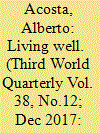

|
|
|
|
|
| Summary/Abstract |
In various parts of the world, growing and serious problems, especially economic, social and environmental, are increasingly calling into question the conventional ideas of progress. The lives of human beings are in danger. We are in ‘the age of survival’, a sort of crossroads in which the future of the human species is defined. That is why alternatives that exceed the dominant concepts typical of Modernity are arising from many sectors and places. Above all, natives are determined to recover their origins and even to strengthen their ancestral practices, from their past to project into the future. And there are those who try to build bridges between these different shores, from which it may be possible to build other worlds where life with dignity for all beings existing on the planet is a possibility.
|
|
|
|
|
|
|
|
|
|
|
|
|
|
|
|
| 20 |
ID:
139102
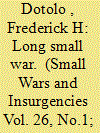

|
|
|
|
|
| Summary/Abstract |
The paper argues that the success of the Italian pacification campaign of Libya in 1932 can be traced to the implementation of a military-centric strategy used in counterrevolutionary warfare, a type of Small War made popular in the early twentieth century and an older form of counterinsurgency. Rather than focus on achieving an acceptable level of security common to modern counterinsurgency doctrine, COIN, the Italians used kinetic military operations to defeat and subdue rebel groups in the two Libyan colonies of Tripolitania and Cyrenaica. The roots of third rebellion, and the military strategy used to pacify the colonies, were developed during the guerrilla war by Ottoman and indigenous groups used to oppose the Italian invasion of Libya during the Italo-Libyan War, 1911–1912. The lessons of Italy's success should make the application of a military-centric rather than a security-centric strategy useful for current counterinsurgencies.
|
|
|
|
|
|
|
|
|
|
|
|
|
|
|
|
|
|
|
|
|